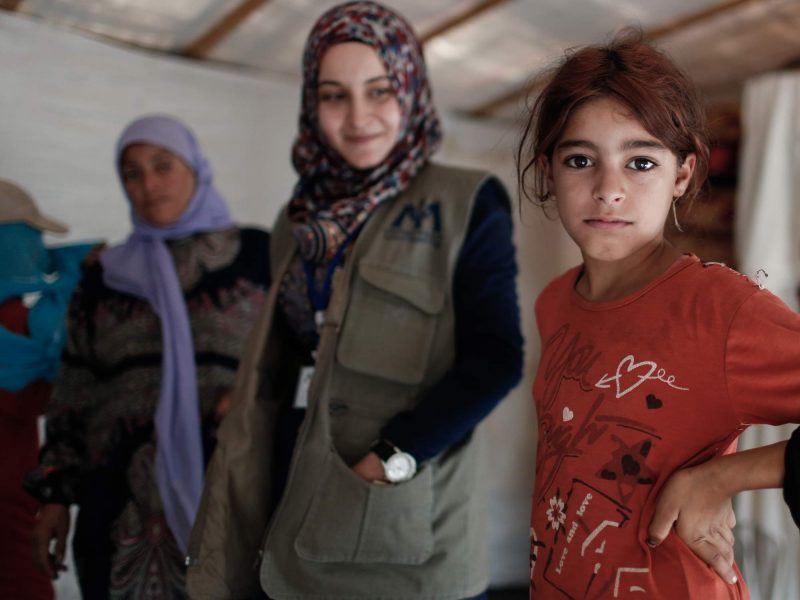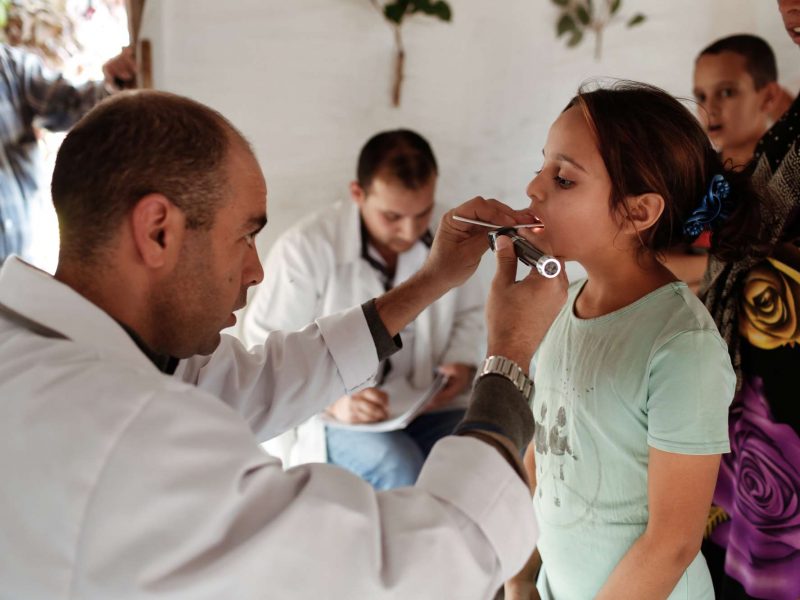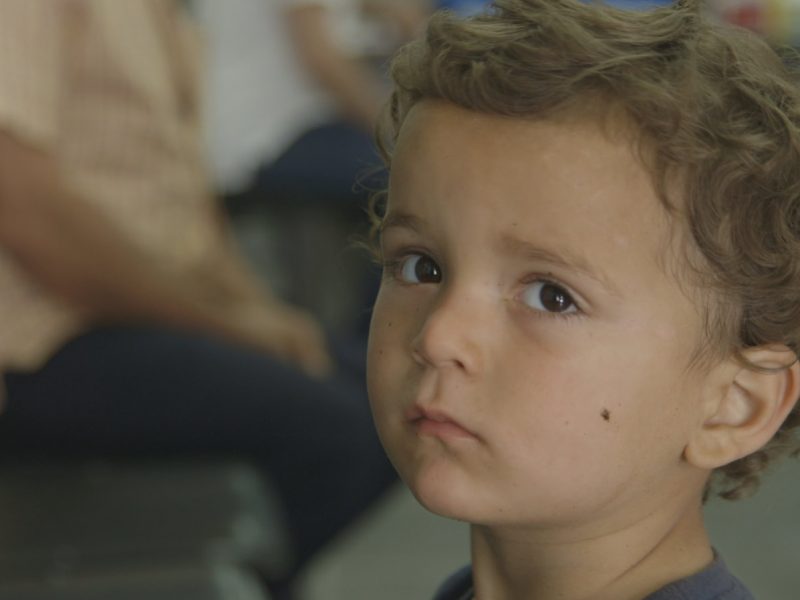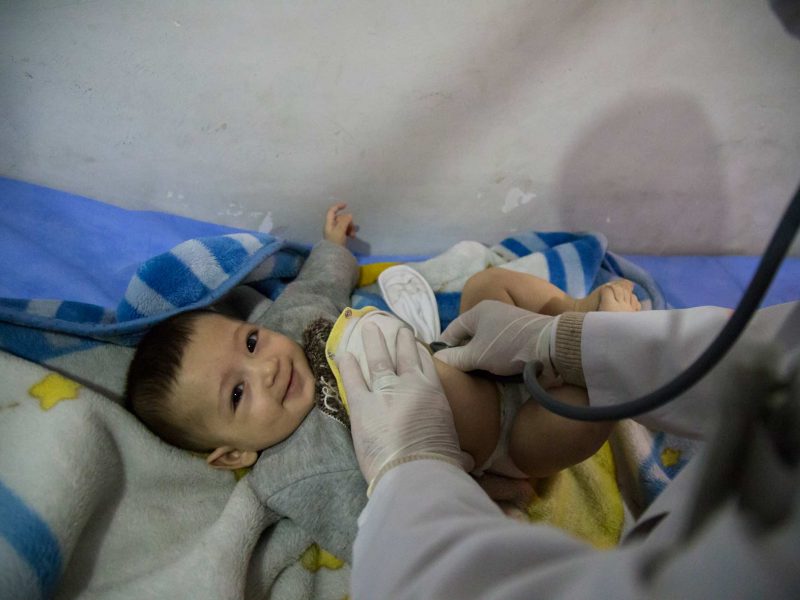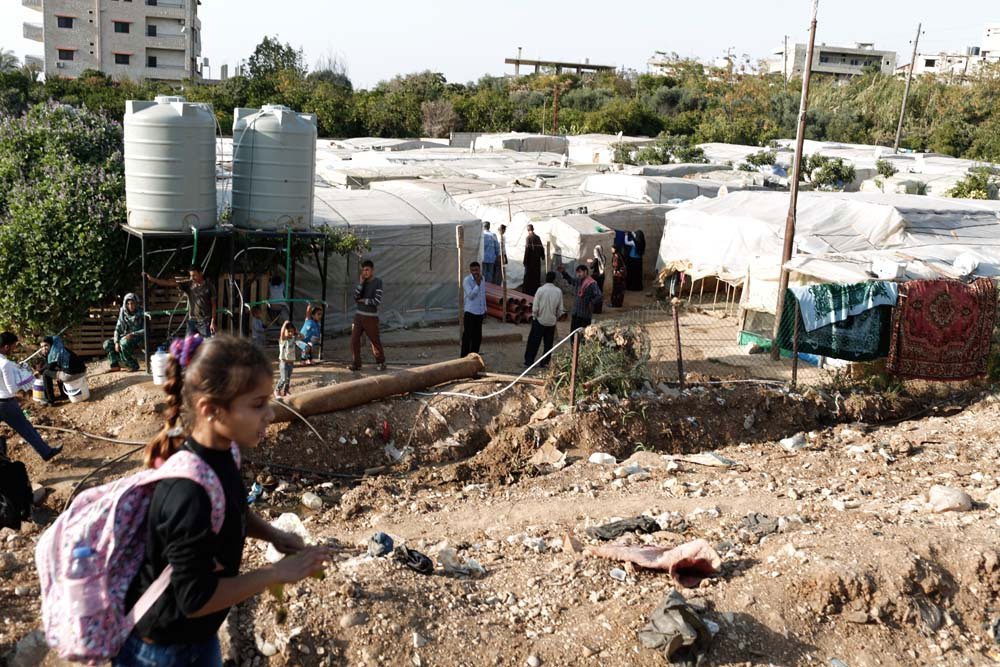
REFUGEE CRISIS IN THE
MIDDLE EAST
Since its beginnings in 2011, the Syrian war has inflicted incomprehensible levels of suffering on civilians and fueled one of the largest displacement crises in the world. An estimated 500,000 have died. At least 6.9 million Syrians are displaced inside the country, while another 5.5 million have fled to the relative safety of other countries.
International Medical Corps works in Syria—as well as in Iraq, Lebanon and Jordan, and formerly in Turkey—to provide medical care, mental health and psychosocial support, gender-based violence prevention and response, and other vital services to Syrian families whose lives have been shattered by conflict.

Countries Impacted
More than 15 Million
people inside Syria need assistance
5.5 Million
Syrian refugees have fled to the safety of other countries
50 %
of the population has been displaced; half are children and youth
Frequently Asked Questions
-
When did the Syrian war start?
The Syrian war started in March 2011 amidst the “Arab Spring,” when peaceful protests escalated to violence following a government crackdown. In the years since, the conflict has steadily become more intense, fractured and complicated, as the number of armed Syrian opposition groups fighting for power multiplied and the Islamic State emerged as a major presence in 2013. That mix drew in outside powers both from the region and further afield.
-
What is happening to families inside Syria?
Civilians in Syria have been exposed to horrific levels of violence that have claimed an estimated 500,000 lives and reduced entire cities and towns to rubble. An estimated 6.9 million Syrians have been displaced from their homes inside Syria, while more than 15 million across the country need humanitarian assistance.
-
Where are Syrians taking refuge?
The Syrian crisis has fueled one of the largest displacement crises since World War II. An estimated 6.9 million Syrians are displaced inside Syria, while another 5.5 million have fled to other countries. The vast majority of Syrian refugees are living in neighboring countries, while more than 1 million have requested asylum in Europe.
-
What specifically is International Medical Corps doing?
On the front lines, International Medical Corps has been helping those displaced in and around Damascus since the start of the conflict. Simultaneously, we continue to support tens of thousands of the 5.5 million Syrians who have sought refuge in neighboring countries, including Lebanon, Iraq and Jordan. In addition, when the door briefly opened for refugees to enter Europe, International Medical Corps was there to help them as they landed on Greek island beaches following often-perilous journeys across the Mediterranean.
The Challenges
Our Response

Healthcare
The war has taken a tremendous toll on Syria’s healthcare system, damaging and destroying hospitals and clinics, and causing countless doctors and nurses to flee the country. Health facilities that are still functioning struggle with limited supplies and equipment, as well as shortages of qualified staff, who can be overburdened and unable to deal with the surge in caseloads when nearby clinics are damaged.
In coordination with the Syrian Arab Red Crescent (SARC), International Medical Corps supported five static primary healthcare clinics and nine mobile medical clinics in 2022, which were staffed with additional technical personnel. All these facilities provide vital primary healthcare services to Syrian families, including preventive and curative care for communicable and non-communicable diseases, mother and child health, reproductive health services, individual and group health education sessions, and early child development programing. We also provide financial support for those affected by life- and disability-threatening conditions through referrals to contracted private hospitals and follow-up services.

Mental Health and Psychosocial Support (MHPSS)
The war has exposed Syrian families to extreme levels of violence. They have lost loved ones, livelihoods and homes. To help Syrians cope with emotional distress and trauma, International Medical Corps integrates MHPSS into our healthcare services. Our Jaramana Recreational Activity Center (RAC), in Rural Damascus governorate, and a mobile MHPSS/protection team offer a wide range of recreational and educational activities to provide psychosocial support to children and families. This support includes programs specifically designed to engage youth, as well as a rehabilitation program for children with development delays and disorders.
International Medical Corps includes protection principles in all of our programs, delivering focused gender-based violence (GBV) prevention and response programs to address specific protection needs in Syria and to provide care and support for survivors. We provide case management in healthcare clinics, and conduct awareness and information campaigns in open communities, displacement shelters and at the Jaramana RAC. In addition, in collaboration with accredited institutions, International Medical Corps offers vocational training and business startup kits to vulnerable displaced and local populations, helping to build resilience and restore livelihoods.

Syrian Refugee Response in Jordan
In Jordan’s Azraq refugee camp, home to nearly 38,000 Syrian refugees, International Medical Corps provides medical care in two primary healthcare clinics and a hospital camp, which together provide an average of 24,000 consultations per month. International Medical Corps recently began providing primary healthcare and emergency care services in Zataari camp through one primary healthcare clinic and one emergency room that is open around the clock.
We offer MHPSS at both International Medical Corps and Ministry of Health facilities. A multidisciplinary team comprising psychiatrists, psychologists, mental health nurses and case managers provides mental health services and psychosocial activities. We engage children and youth with mental health concerns in structured activities to relieve their concerns and improve their psychological and social well-being. In addition, International Medical Corps runs a safe space for women and girls in Azraq camp where protection measures are in place to help prevent GBV.

Syrian Refugee Response in Lebanon
International Medical Corps provides a comprehensive package of essential services in Lebanon, home to more than 800,000 Syrian refugees. We support a network of more than 65 primary healthcare centers throughout the country that offers a wide range of curative and preventive healthcare through routine physical examinations, pediatric check-ups, growth monitoring, immunization and reproductive health services, including maternal health and family planning.
We integrate mental health services into primary healthcare in a culturally sensitive manner to improve access among Syrian refugees and residents of the local Lebanese host community. Mental health case management teams, consisting of social workers, psychotherapists and psychiatrists, work with local partners to ensure that services are available for those in need of psychiatric, psychological and social support. At the community level, case managers play a key role in raising awareness of the importance of mental health and in providing information about available support services.

Syrian Refugee Response in Turkey
In partnership with local organizations, International Medical Corps supported primary healthcare centers in Turkey to increase Syrian refugees’ access to medical services. The facilities offer free primary healthcare (including pediatric clinics), reproductive and maternal healthcare, and mental health and psychosocial support. We also worked to prevent and respond to gender-based violence in Turkey by providing case management for existing cases, offering mental health support for survivors and helping to empower Syrian women through training and skills-building activities.
Psychological Toll of War and Uncertainty
Like more than 15 million other Syrians, Hana and her family lost everything to the country's brutal and unending war, fleeing their home in the western city of Homs about five years ago. More than half of Syria's displaced have sought shelter elsewhere in the country while the balance are scattered across the globe, unsure of when they will reunite again—if ever.
READ MORE